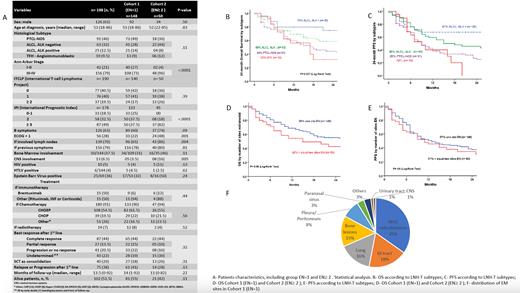Introduction: T cell lymphomas (NHL-T) account for 10-15% of all non-Hodgkin lymphomas (NHL). They are a heterogeneous group of infrequent neoplasms with a variable clinical course but prevalently aggressive behavior and high mortality rates. Diagnosis is still challenging and there has been little change in the overall prognosis over the last two decades. In spite of IPI (International Prognostic Index) that include extranodal (EN) site in its variables, lack is known regarding EN involvement in nodal peripheral T cell lymphomas- PTCL (PTCL-NOS, TFH and ALCL ALK+/ALK-) location or impact on prognosis).
Objective: We aim to evaluate number of extranodal (EN) sites in nodal PTCL lymphomas (PTCL-NOS, TFH and ALCL ALK+/ALK-) and its specific location as a surrogate for overall survival (OS) and progression free survival (PFS). Also generate hypothesis for further molecular analysis.
Methodology: Brazil T-cell project is a national, ambispective study of patients with histological diagnosis of PTCL diagnosed from January 2015 to December 2022. Approval for the study was obtained at the coordinating center (Samaritano Hospital - São Paulo) and at each participating center as per the institutional standard before initiation. Those selected for the study were previously untreated patients age ≥ 19 years, with de novo PTCL or natural killer/T-cell lymphoma. At each institution, the local pathologist reviewed the diagnose. Clinical information included coded patient and site identifiers, sex, date of birth, date and site of diagnostic biopsy, sites of disease, EN (location and number), methodology of staging (clinical, CT or Pet) and Ann Arbor stage. Initial therapy and response; details of remission, progression, or relapse; and subsequent therapies, along with survival status and cause of death. Treatment outcome was determined by OS and PFS. REDcap Platform (by Vanderbilt) has been used to collect and store data and for descriptive analysis the IBM-SPSS version 24 was applied. Kaplan-Meier method estimated the OS, whereas Log-Rank tests to compare its curves. This trial is registered at Clinical trials (NCT03207789).
Results: Of 621 registered we selected 198 patients (pts) diagnosed with nodal PTCL with at least one EN involvement [Cohort 1 EN involvement equal to one (148 pts) and Cohort 2 EN involvement ³ 2 (50 patients)]. Considering all 198 pts (Cohort 1 and 2) there was a slight male predominance (63%); median age 53 years; 79% were staged III or IV; 81.5 were IPI 2 or more. Most frequently histology was PTCL-NOS (46%), followed by ALCL ALK+ (32%), ALCL ALK- (12.5%) and TFH (9.5%). The majority had B Symptoms (63%); 37.5% had Bone Marrow infiltration. The chemotherapy most frequently chosen were CHOEP (54.5%) followed by CHOP (19.5%). Transplant was used as consolidation in 20% of the cases. Almost half of patients achieved complete response after first line (44%), although 38% relapsed. Cohort 1 (EN=1) and 2 (EN ³ 2) were similar regarding clinical characteristics, except, for stage III-IV (73% vs 96%; p <.0001); IPI ³ 3 (37.5% vs. 82%; p <.0001) and ECOG (22 vs. 48%; p=.001), respectively. Therefore, translating in a more advanced disease in Cohort 2. The most common extranodal location in Cohort 1 (EN=1) was Skin/ Subcutaneous (35%), followed by gastrointestinal tract (18%) and lung (16%). NHL-T subtypes behaved similarly in this EN exploratory analysis, with a better OS and PFS in ALCL ALK+, followed by ALK- and PTCL-NOS. There was no difference in PFS in Cohort 1 (EN=1) and 2 (EN ³ 2), but there was a slight difference in Overall survival (55% vs. 42% in 12 months; p=0.06), suggesting EN sites involvement assessed by CT and PET-CT as possible surrogate for outcomes in this population.
Conclusion: NHL-T is still unmet medical need considering suboptimal outcome in treatment and survival. New biological and clinical finding are still necessary to adequate stratify this group of patients, considering poor performance of IPI and PIT scores. Number and location of EN sites involvement may be a possible surrogate for outcome, which can be a reflect of a distinct biology, that needs further investigation. Registries are of importance considering rarity and poor prognosis of this diseases and an adequate instrument to hypothesis generation.
Disclosures
Gaiolla:Lilly, janssen, Abbvie, Takeda, MSD.: Speakers Bureau; Lilly, janssen, beigene, Abbvie, Roche: Honoraria; Janssen, Takeda: Other: Travel support. Perini:AstraZeneca, Janssen, MSD, Merck, Abbvie, Takeda: Consultancy; AstraZeneca, Janssen, MSD, Merck, Abbvie, Takeda: Speakers Bureau. Chiattone:ROCHE, ABBVIE, JANSSEN, AZ, LYLLI, TAKEDA: Honoraria; ROCHE, ABBVIE, JANSSEN, AZ, LYLLI, TAKEDA: Consultancy.


This feature is available to Subscribers Only
Sign In or Create an Account Close Modal